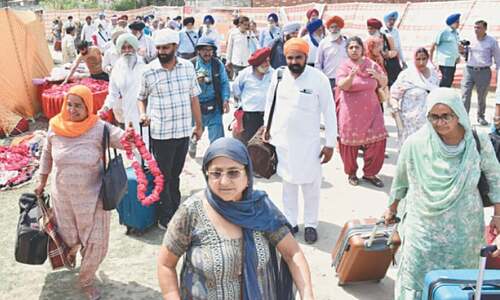LAHORE: Speakers at a conference on ‘Punjab Local Government Laws and Women’s Political Participation’ agreed that women in politics played a pivotal role in strengthening democracy.
The conference was organised by the Women in Struggle for Empowerment (WISE) at a local hotel on Tuesday where a report on the “Gender Audit of Women’s Political Representation in the Legislative Assemblies,” was also launched.
Women and representatives of civil society and non-government organisations joined the event to discuss the new report.
They said over the last 20 years steps had been taken towards inclusion of women in the political sphere all around the world.
“Rwanda has about a 61.3 percent women’s representation, followed by Cuba with 53.2 percent and Bolivia with 53.1 percent. Nepal and Afghanistan have made great progress in this regard, and some countries have ensured more than 50 percent of representation, but in Pakistan the ratio of women’s political representation is decreasing, not only in the national and provincial assemblies but also in local government institutions,” they showed their concern.
WISE Executive Director Bushra Khaliq said if women were given equal share in political participation at all levels, including cabinets, central executive committees of political parties, and the legislative houses, they would have the capacity to bring about a positive change in the country.
“Pakistan, India, Bangladesh and Sri Lanka have all been ruled by women leaders in the past but the representation of women at other levels in all these countries is still very low as compared to many other countries. In South Asia, Nepal is on top with 32.7 percent women in the parliament, followed by Afghanistan 27.3 percent, Bangladesh 20.6 percent, Pakistan 20.2 percent, Bhutan 14.9 percent, India 12.6 percent, Sri Lanka 5.3 percent and Maldives 4.7 percent.”
Mr Bushra said the highest ratio of women’s representation was in the National Assembly of Pakistan – around 22 percent between 2008 and 2013.
“In the current, assemblies it is only around 19 percent. There is no women representation in the cabinets of Khyber Pakhtunkhwa and Balochistan.”
In the central executive committees (CEC) of mainstream political parties, she pointed out there were only two women in the 27-member CEC of the PML-N, one member the 21-member CEC of the PTI, five in the 35-member CEC of the PPP, one in 19-member the PML-Q’s CEC, two in the 35-member committee of the MQM and two in the 12-member CEC of the ANP.
At least 33 percent share must be women’s, in the legislative houses, cabinets and CECs of the political parties, Bushra suggested.
Local government expert, Zahid Islam, throwing light on the twin LG laws – the Punjab Local Government Act 2019 and the Punjab Village Panchayat and Neighborhood Councils Act 2019–said the ratio of women representation at different tiers had been further reduced.
“It is good that the minimum age for candidates has been reduced from 25 to 18 years but there is still need for the provincial governments to review these laws to make them more pro-people. For instance, reserved seats for peasants and workers in village Panchayat and neighborhood councils should be restored and disconnect between two laws should be bridged,” he said.
Tanveer Jahan, the executive director Democratic Commission for Human Development (DCHD), said democracy was not merely about elections, participation and representation, it was more about accommodating each other’s points of view, giving equal opportunities of political participation to all sections of society, especially marginalised sections.
However, treating the minority sections as simply that has reduced them to mere tokenism. “It is conditional to the ultimate goal of inclusive democracy that there must not be tokenism,” she said. “It is also high time that women must fight to reclaim their space I political representation.”
Imtiaz Arif, the director of the Local Govt and Community Development, said different suggestions were under consideration to bridge the vertical gap between the two LG laws and interconnect them. He said the current offices of UCs were likely to be named as citizens’ facilitation centres to provide them with services, including registration and issuance of birth, death and marriage certificates.
Zafarulla Khan, constitutional expert, said that it was unfortunate that the LG system was changed every five years by the ruling parties without taking the people into confidence.
Published in Dawn, January 22nd, 2020













































